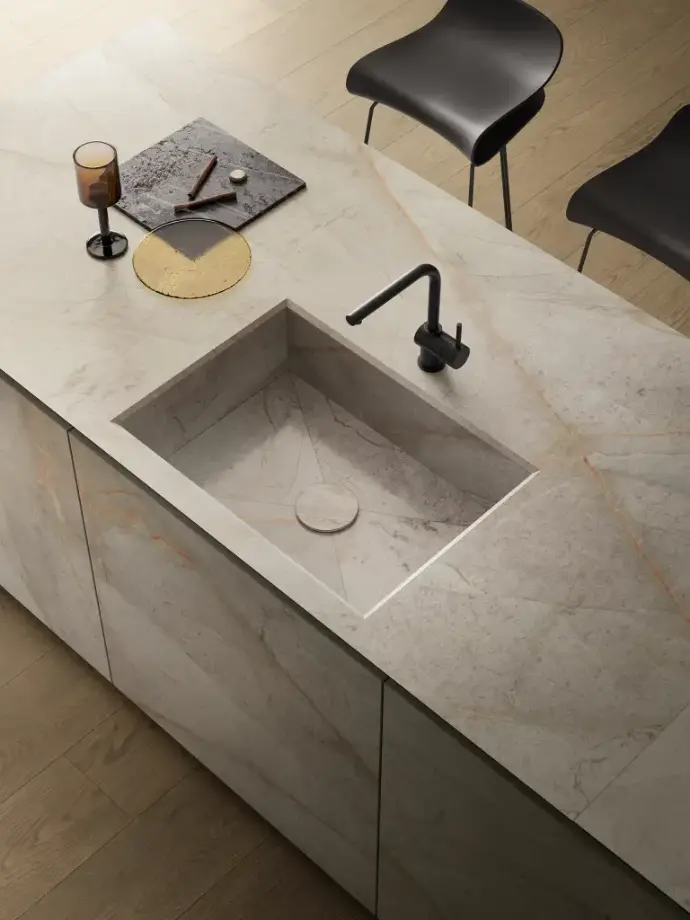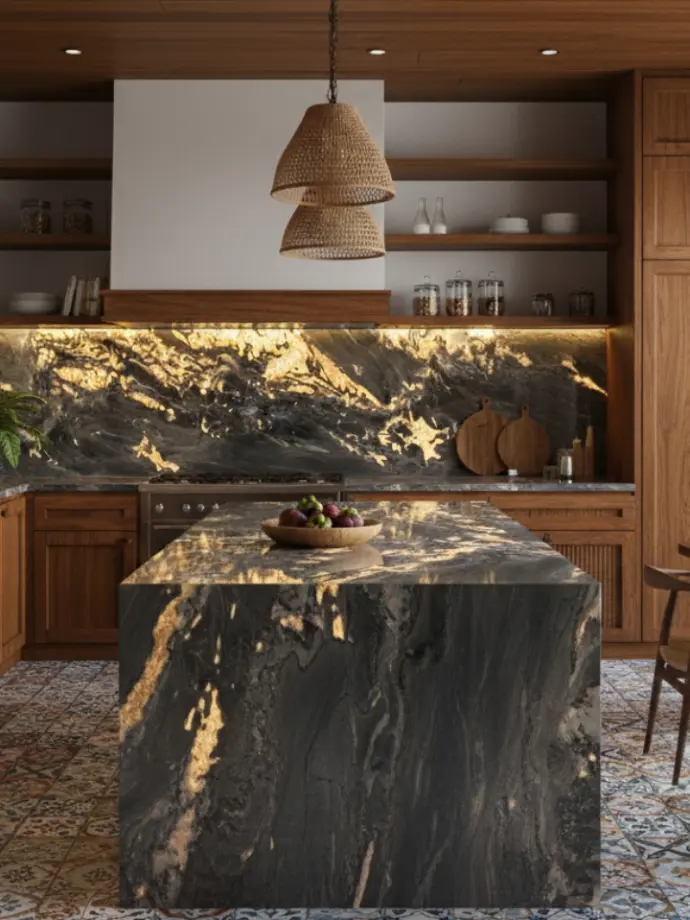When renovating your kitchen or bathroom in Malaysia, choosing the right countertop material can feel overwhelming. Two premium options dominate the market today: porcelain slabs and quartz stone. Both promise durability, beauty, and low maintenance—but which one is right for your Malaysian home?
In this guide, we'll compare porcelain slab and quartz stone countertops across the factors that matter most to Malaysian homeowners: cost, durability, maintenance, aesthetics, and suitability for our tropical climate.
What Are Porcelain Slab Countertops?
Porcelain slabs are made from refined clay and natural minerals that are pressed and fired at extremely high temperatures (over 1,200°C). This process creates a dense, non-porous surface that's incredibly hard and resistant to heat, stains, and scratches.
Key characteristics:
- Lightweight with standard countertop thickness of 12mm
- Available in large-format slabs (up to 3.2m × 1.6m)
- Can mimic natural stone, concrete, wood, and even fabric textures
- UV-resistant and suitable for outdoor applications
- Scratch-resistant and stain-proof
- Suitable for walls, floors, and countertops
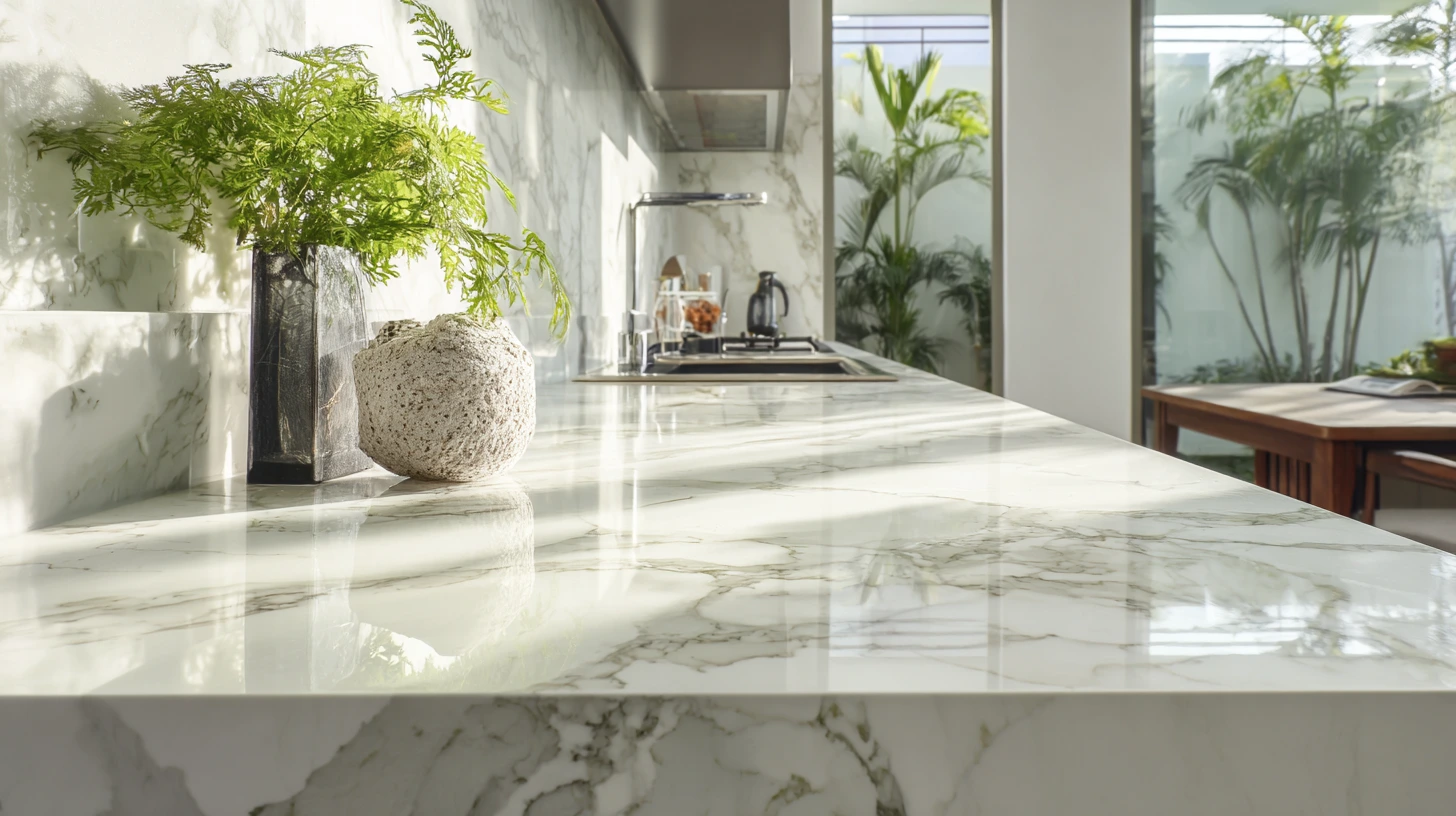
What Are Quartz Stone Countertops?
Quartz stone countertops—also called engineered quartz—are manufactured from natural quartz crystals (up to 93%) combined with polymer resins and pigments. The mixture is compressed under high pressure to create a solid, non-porous surface.
Key characteristics:
- Extremely hard and durable
- Consistent patterns and colours with an elegant, polished look
- Non-porous surface resists staining
- Wide variety of designs, from solid colours to marble-look finishes
- Ideal for heavy kitchen use
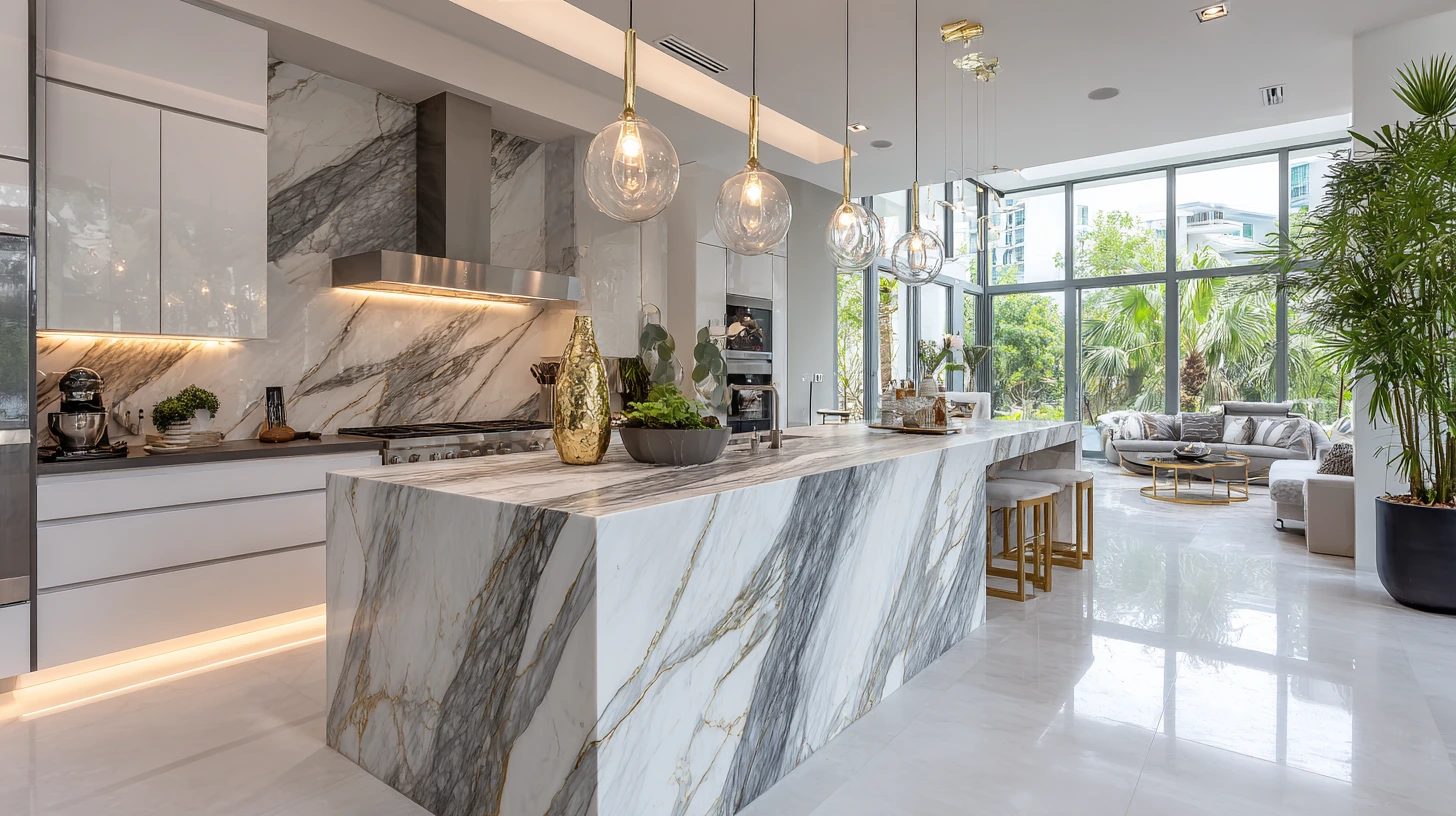
Porcelain Slab vs Quartz Stone: Head-to-Head Comparison
1. Durability and Scratch Resistance
Porcelain slabs are exceptionally hard—rated 7–8 on the Mohs hardness scale. They resist scratches and abrasion very well, making them ideal for busy kitchens.
Quartz stone is equally impressive, with a Mohs rating of around 7. Both materials can handle daily kitchen tasks without showing significant wear.
Winner: Tie. Both materials are highly durable for Malaysian kitchens.
2. Heat Resistance
Porcelain slabs excel in heat resistance. Fired at ultra-high temperatures, they can withstand direct contact with hot pots and pans without damage or discolouration. This is particularly useful in Malaysian kitchens where woks and hot cookware are common.
Quartz stone is heat-resistant but not heatproof. The resin binders can be damaged by prolonged exposure to high heat. Using trivets or hot pads is recommended.
Winner: Porcelain slabs, especially if you frequently cook with high heat.
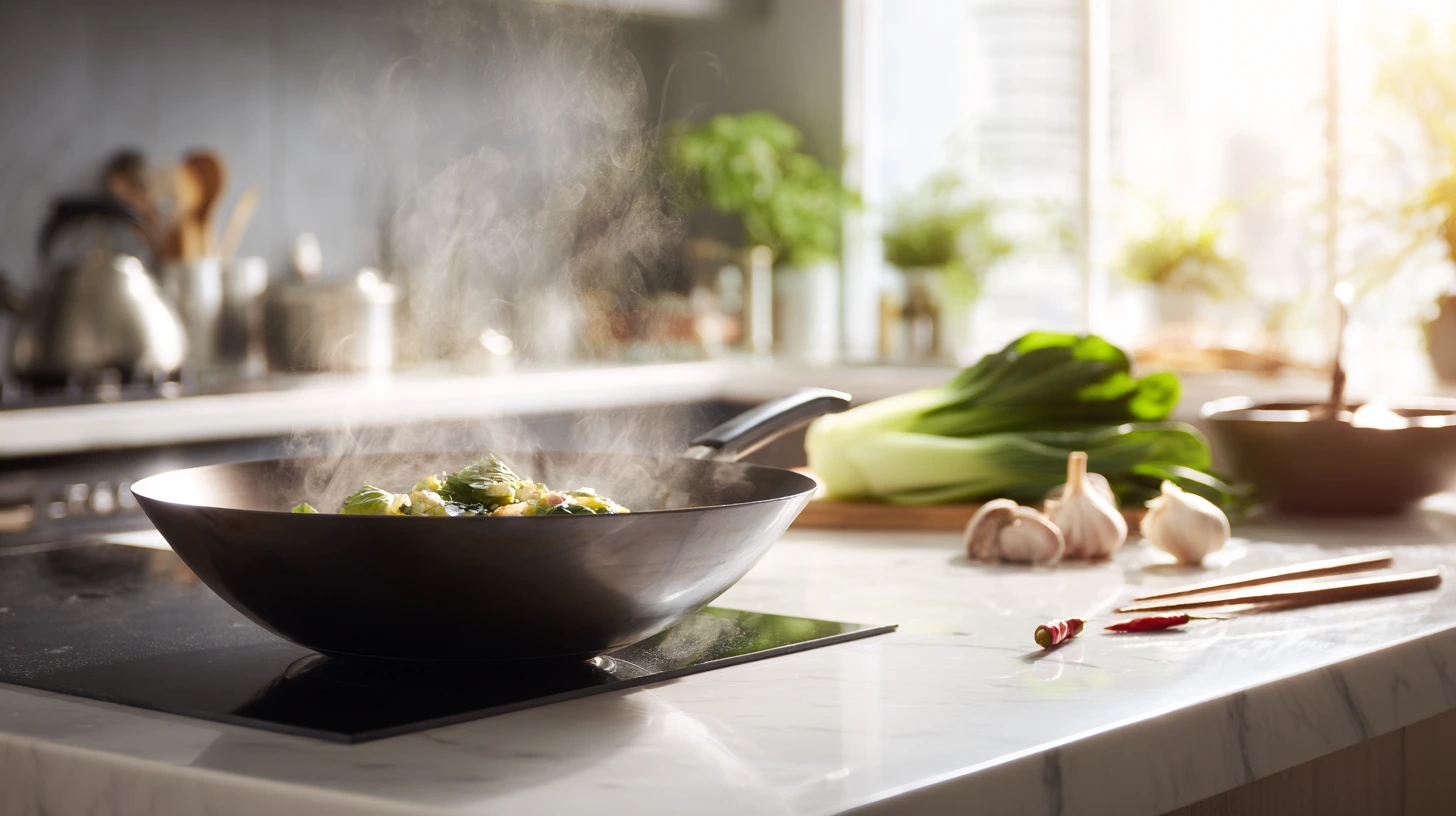
3. Stain Resistance and Maintenance
Both materials are non-porous, which means they resist staining from common kitchen substances like coffee, curry, and cooking oil.
Porcelain slabs require minimal maintenance. Simply wipe with a damp cloth and mild detergent. No sealing is needed—ever.
Quartz stone is equally low-maintenance. Routine cleaning with soap and water keeps it looking pristine. Like porcelain, it never needs sealing.
Winner: Tie. Both are excellent choices for Malaysian homeowners who want low-maintenance surfaces.
4. Appearance and Design Options
Porcelain slabs offer incredible versatility. Advanced printing technology allows manufacturers to replicate natural stone (marble, granite, travertine), concrete, wood grain, and even metal finishes with remarkable accuracy. Large-format slabs mean fewer visible seams in your countertop.
Quartz stone provides a wide range of colours and patterns, from pure white to dramatic marble veining to bold, contemporary colours. However, the engineered look may not match the depth and variation of natural stone as closely as porcelain can.
Winner: Porcelain slabs, if you want highly realistic natural stone looks and large-format installations with minimal seams.
5. Weight and Installation
Porcelain slabs are significantly lighter than quartz (up to 50% lighter in some cases), typically coming in 12mm thickness for countertops. This makes them easier to transport and install, and they may require less structural support—a consideration for some condo renovations in the Klang Valley.
However, porcelain slabs have limited edge profile options compared to quartz. The thinner material restricts the types of decorative edges that can be fabricated, and professional installation is essential to avoid breakage during handling.
Quartz stone is heavier and typically comes in standard thicknesses of 20mm or 30mm. Installation requires skilled fabricators and stronger cabinetry support. The thicker material allows for a wider variety of edge profiles, including bevelled, bullnose, and ogee edges.
Winner: Porcelain slabs for weight and ease of transport; quartz for edge profile flexibility.
6. UV Resistance and Outdoor Use
Porcelain slabs are completely UV-resistant and will not fade or discolour in sunlight. This makes them suitable for outdoor kitchens, balcony counters, and alfresco dining areas—popular in Malaysian landed homes.
Quartz stone can fade or yellow over time when exposed to direct sunlight due to the resin content. It's not recommended for outdoor use in Malaysia's intense tropical sun.
Winner: Porcelain slabs, if you're planning outdoor applications.
7. Cost Comparison in Malaysia
Pricing varies based on brand, thickness, finish, and design complexity, but here's a general guide for the Malaysian market:
Porcelain slabs:
- RM 110 – RM 180+ per square foot (depending on design and thickness)
- Generally more affordable than premium quartz options
Quartz stone:
- RM 110 – RM 800+ per square foot
- Higher-end options can be significantly more expensive than porcelain
Winner: Porcelain slabs offer better value for money, especially when compared to premium quartz options, making them an increasingly cost-effective choice for Malaysian homeowners.
8. Availability and Fabrication in Malaysia
Quartz stone has a well-established presence in Malaysia. Many local suppliers and fabricators offer quartz countertops, making it easy to find options and get competitive quotes.
Porcelain slabs are newer to the Malaysian market but growing rapidly. Availability is increasing, particularly in the Klang Valley and Penang, though you may need to work with specialised fabricators experienced in handling thin slabs.
Winner: Quartz stone, due to wider availability and fabricator experience—though porcelain is catching up quickly.
Design Ideas and Best Use Cases
Porcelain Slab Applications
Porcelain slabs work beautifully in modern, minimalist kitchens where clean lines and seamless surfaces are priorities.
Best uses:
- Outdoor kitchens and balcony counters – Perfect for Malaysian landed homes with alfresco dining areas. The UV resistance ensures colours stay vibrant for years.
- Kitchen backsplashes – Large-format slabs create stunning, seamless backsplashes with minimal grout lines.
- Wet and dry kitchen countertops – Heat resistance makes them ideal for Malaysian cooking with woks and high-heat equipment.
- Bathroom vanities – Lightweight material is perfect for wall-mounted vanities in modern bathrooms.
- Feature walls – The same material can extend from countertop to wall for a cohesive, contemporary look.
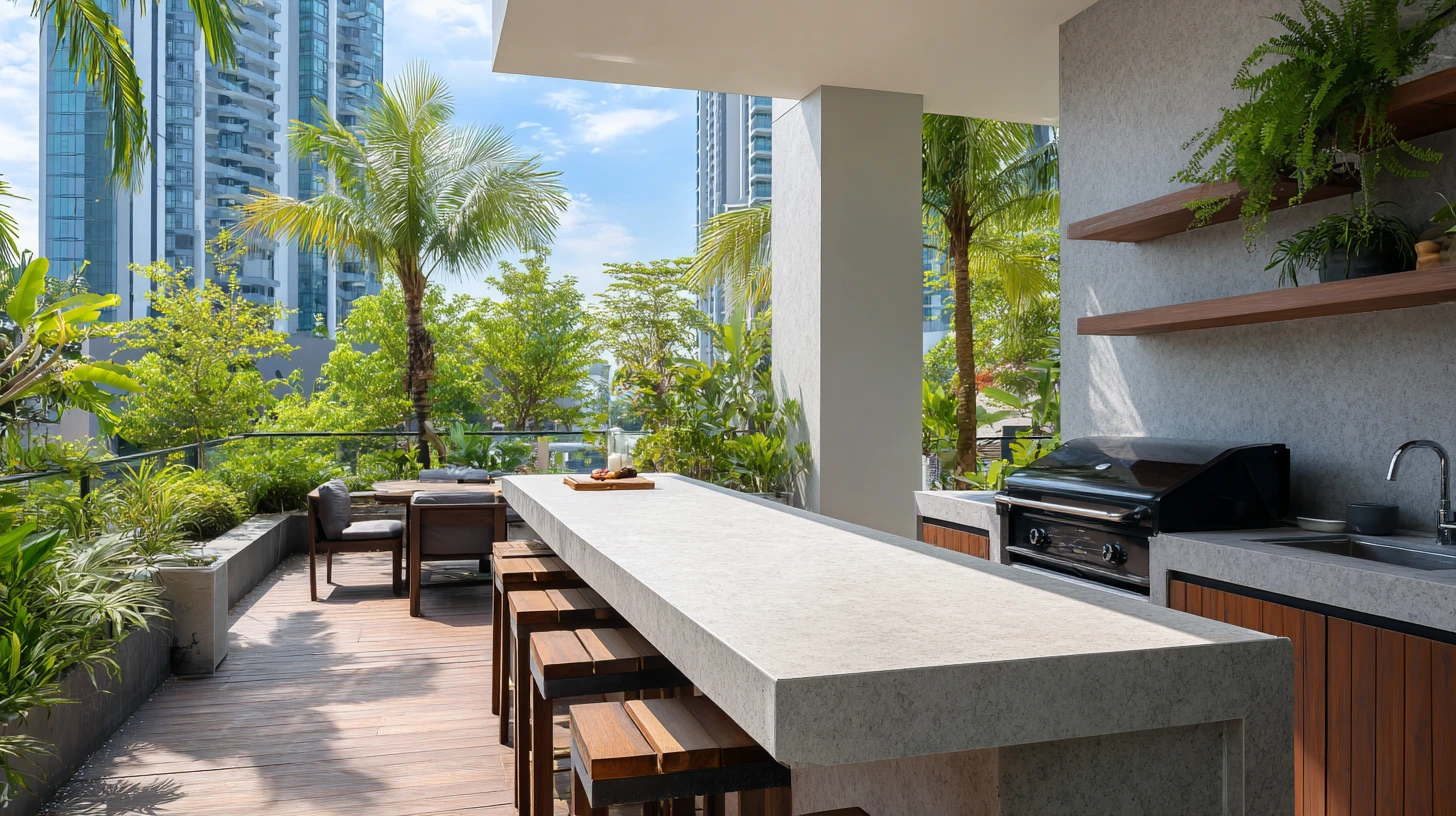
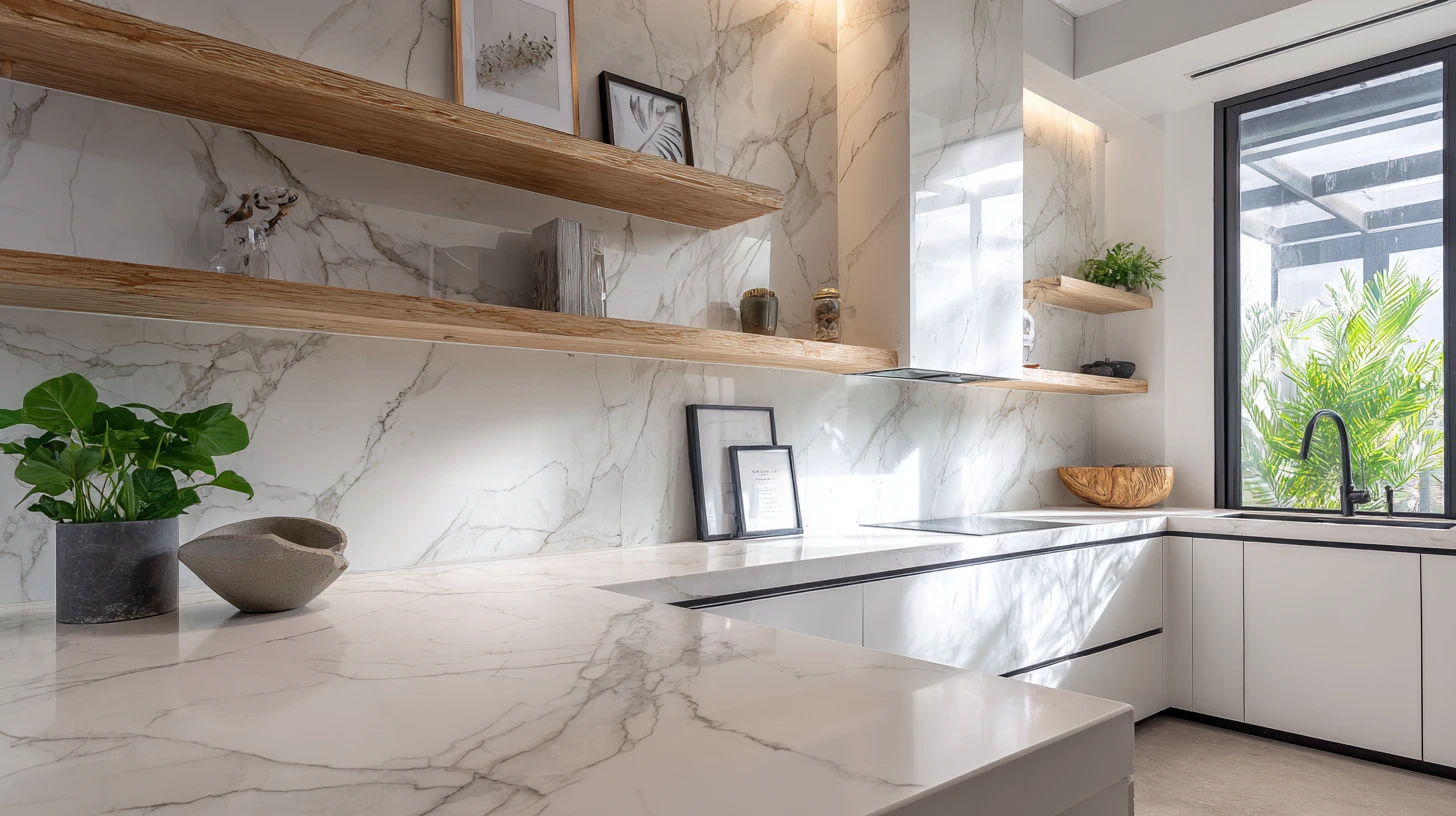
Quartz Stone Applications
Quartz stone is perfect for luxurious, high-traffic kitchens where consistent beauty and durability are paramount.
Best uses:
- Waterfall islands – The thicker material and variety of edge profiles make quartz ideal for dramatic waterfall countertops that flow down the sides of kitchen islands.
- Statement countertops – Bold marble-look patterns create stunning focal points in open-concept kitchens.
- Heavy-use prep areas – The non-porous surface handles frequent food preparation without staining or dulling.
- Indoor wet kitchens – Excellent for Malaysian wet kitchens where spills and moisture are common, though heat protection is recommended.
- Integrated sinks – Thicker quartz allows for seamless undermount sink installations with substantial support.
Which Should You Choose for Your Malaysian Home?
Choose Porcelain Slabs If:
- You frequently cook with high heat (woks, hot pots)
- You want outdoor countertops (e.g., balcony or garden kitchen)
- You prefer a lightweight material for upper-storey installations
- You want ultra-realistic marble or stone looks with minimal seams
- You value UV resistance and long-term colour stability
- You're designing a modern, minimalist kitchen
- You want to use the same material on walls and countertops
Choose Quartz Stone If:
- You want a proven, widely available option in Malaysia
- You prefer consistent patterns and colours
- You're looking for a slightly more budget-friendly premium option
- You don't need outdoor or high-heat applications
- You value the peace of mind that comes with many experienced local fabricators
- You want decorative edge profiles for a luxurious look
- You're creating a waterfall island or statement countertop
The Bottom Line
Both porcelain slab and quartz stone countertops are excellent choices for Malaysian homes. They're both durable, low-maintenance, and beautiful—so your decision ultimately comes down to your specific needs and design vision.
If you prioritise heat resistance, outdoor use, or ultra-realistic natural stone aesthetics, porcelain slabs are the way to go. If you want a well-established material with wide availability, decorative edge options, and slightly lower costs, quartz stone remains a fantastic choice.
Whichever you choose, make sure to work with reputable suppliers and experienced fabricators to ensure proper installation and long-lasting results.
If you've got an upcoming stone project, let's talk.
